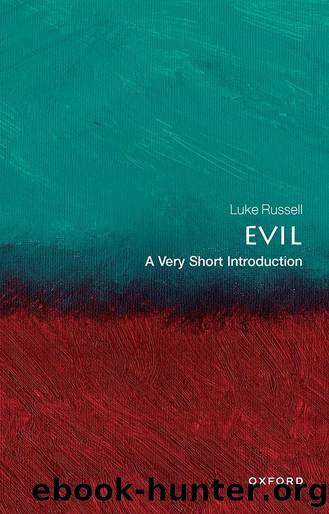Evil by Luke Russell

Author:Luke Russell [Russell, Luke]
Language: eng
Format: epub
ISBN: 9780192551368
Publisher: OUP Oxford
Published: 2022-08-22T00:00:00+00:00
Chapter 4
The banality of evil
One of the most memorable phrases of 20th-century intellectual life, coined by Hannah Arendt in her 1961 book Eichmann in Jerusalem, is âthe banality of evilâ. It has the pleasing ring of familiarity, and it is clearly supposed to be profound. When we hear it said, many of us sagely nod along. But what does it mean? In this chapter we will see how Arendtâs famous phrase should be interpreted, and trace the influence of Arendtâs analysis of the trial of the Nazi war criminal Adolf Eichmann. Arendtâs claims about Eichmann have led some contemporary philosophers to reject the idea that the difference between evil and wrong must be qualitative rather than quantitative. They reject the view that every evildoer shares the same kind of distinctive, distorted motivational structure, and claim instead that evil actions can come from a broad range of familiar motives, and sometimes are performed by ordinary people like you and me.
Before we engage with Arendtâs thoughts about banality, there is one final location in which we ought to search for a qualitative difference between evil actions and ordinary wrongs. This is the effects that actions have on their victims: in other words, with the kinds of harms that they inflict. Harms fall into distinct sub-categories: infliction of physical pain, maiming, enslavement, rape, public shaming, theft, removal of valued options, and so on. Could it be that evil actions harm their victims in a special way, a way in which victims are never harmed by ordinary wrongs? If this were true, evil action could be defined as wrong action that inflicts this special kind of harm. This is an attractively simple suggestion. In order to complete the theory all we need to do is identify the unique kind of harm that marks out evils from ordinary wrongs.
As soon as we start assessing candidates, though, the whole project falls apart. Is the distinctive harm caused by evil actions the death of an innocent human being? If so, then every wrong action that causes an innocent human death would count as evil, and every wrong action that does not cause an innocent human death would fail to count as evil. Both of these claims seem utterly implausible. Some wrong actions that cause human deaths are cases of culpable negligence or recklessness. No doubt these actions are tragic, grave, and serious, but how do they compare to a case in which a sadistic torturer deliberately inflicts terrible pain on a terrified group of captives for years and years without killing any of them? Does it really seem that the act of reckless manslaughter is evil but the repeated sadistic acts of torture are not? Perhaps the distinctive harm is something else: the destruction of the victimâs will to live, or the failure to respect what the victims hold sacred. A torturer may well destroy his victimsâ will to live, and arguably what the torturer does is evil. Yet a suicide bomber does not destroy his victimsâ will to live.
Download
This site does not store any files on its server. We only index and link to content provided by other sites. Please contact the content providers to delete copyright contents if any and email us, we'll remove relevant links or contents immediately.
The European Opportunity by Felipe Fernández-Armesto(569)
The European History Highway: A Guide to Internet Resources by Dennis A. Trinkle Scott A. Merriman(535)
Morgan Kaufmann Digital Watermarking and Steganography by Ingemar Cox Matthew Miller Jeffrey Bloom Jessica Fridrich Ton(528)
The Seven Wonders of the Ancient World by Michael Denis Higgins(520)
Hyperculture by Byung-Chul Han(509)
European Security in a Global Context by Thierry Tardy(505)
European Security without the Soviet Union by Stuart Croft Phil Williams(502)
The Routledge companion to Christian ethics by D. Stephen Long Rebekah L. Miles(498)
Get Real with Storytime by Julie Dietzel-Glair & Marianne Crandall Follis(443)
Hudud Al-'Alam 'The Regions of the World' - a Persian Geography 372 A.H. (982 AD) by V. V. Minorsky & C. E. Bosworth(436)
Gorbachev And His Generals by William C. Green(428)
Tibetan Studies in Comparative Perspective by Chih-yu Shih Yu-Wen Chen(427)
Governance, Growth and Global Leadership by Espen Moe(417)
How Languages Are Learned 5th Edition by Patsy M Lightbown;Nina Spada; & Nina Spada(406)
CliffsNotes on Fitzgerald's The Great Gatsby by Kate Maurer(399)
The Oxford History of the World by Fernández-Armesto Felipe;(388)
The Egyptian Economy, 1952-2000 by Khalid Ikram(379)
Oral Poetry and Narratives from Central Arabia: The Poetry of Ad-Dindan : A Bedouin Bard in Southern Najd (Studies in Arabic Literature, Vol 17) (English and Arabic Edition) by P. M. Kupershoek P. Marcel Kurpershoek(365)
The Oxford Handbook of the Incas by Sonia Alconini(364)
